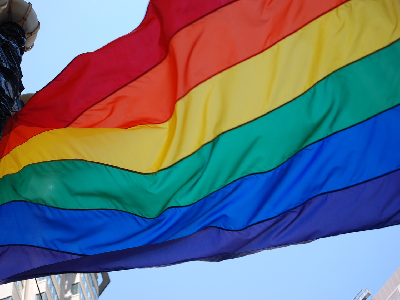Op-ed: If We Want LGBT+ Talent to Succeed, Leaders and Allies Need to Stand Up and Be Counted
By Jon Terry, Diversity and Inclusion Consulting Leader, PwC UK
Growing up in multicultural London, I saw how diversity can enrich our communities.
My childhood experiences helped to inspire my passion for strengthening diversity and inclusion in the workplace and focus on doing so within my internal and client-facing roles at PwC. From fresh perspectives to stronger engagement and motivation, the power of inclusion is something I see right across my work with colleagues and clients.
What’s also clear to me is that businesses prosper in an environment that enables all their talent to thrive. For LGBT+ talent, as with all employees, this means ensuring that they can realize their full potential without barriers and bias. It also means creating an environment where LGBT+ talent can feel safe to be their true selves and fully participate in the workplace. Just as I can talk openly about my wife and what I did at the weekend, my LGBT+ colleagues should be able to engage with their colleagues without feeling the need to be guarded or closeted.
Are businesses around the world creating an environment where LGBT+ talent can thrive? Are businesses realizing the full benefits? These are some of the key questions addressed in Out to Succeed: Realising the full potential of LGBT+ talent, a survey of corporate leaders and high performing LGBT+ talent, which was carried out earlier in the year by PwC in conjunction with Out Leadership, the global LGBT+ business network.
The case for inclusion
The business case for LGBT+ inclusion comes through loud and clear from the survey findings. Around two-thirds of the LGBT+ employees taking part believe that having a supportive focus on LGBT+ talent has given their organization a better understanding of customers’ wants and needs. Employers are even more emphatic, with nearly 90% believing that a supportive LGBT+ focus has enabled them to gain a better understanding of customer demands.
In a competitive labor market, inclusion is also a talent differentiator – more than 80% of employees believe that having an openly supportive focus on LGBT+ has provided their organization with wider access to the best talent. Almost all the employers we asked agree.
Being your true self
Yet, while progress on inclusion is being made – more than 80% of the LGBT+ employees in our survey feel comfortable being out at work – support for LGBT+ talent is still falling short in many organizations.
One of the most telling findings is the two-year gap between the median age when gay male participants came out to family and friends (age 21) and when they come out at work (age 23). Among women, the gap between coming out in their personal and professional lives is an even wider at five years with the average age of coming out at work then being 26. This reluctance to be their true selves at work should be a cause for concern for companies that think they’re doing enough to create a safe and supportive environment.
It’s also telling that even among the openly LGBT+ talent in our survey, a high proportion prefer to cover aspects of their lives and behave in a guarded way in the workplace. Two in five avoid mentioning their life outside work. One in three have kept quiet when they’ve heard negative comments about LGBT+ people. The fact that so many LGBT+ professionals remain guarded not only hinders organizations in recruitment and retention, but, more importantly, this hinders the careers of LGBT+ professionals.
Realizing potential
And this uncertainty extends to opportunities for advancement. Career progression is the number one priority for the LGBT+ developing leaders in our survey. The majority according to the survey, see LGBT+ specific training and development programs as important elements in making them want to work for an organization. Yet, less than 30% of the businesses we surveyed have programs specifically focused on the retention, development and progression of LGBT+ talent. Many of the LGBT+ employees who do have access to such programs aren’t even aware that they exist.
It is our belief that if LGBT+ employees don’t feel they can realize their full potential within their current organization, they will vote with their feet by looking for opportunities elsewhere. In turn, businesses will miss out – only 35% of the LGBT+ employees in our survey believe that their company leverages LGBT+ inclusion for business advantage.
True inclusion
So how can businesses give LGBT+ talent the confidence they can succeed within their organizations? Drawing on the survey findings, the Out to Succeed report sets out five key recommendations for promoting real equality and opening up the full business benefits of LGBT+ inclusion:
1. Set the right tone from the top and engage with CEOs
2. Create clear pathways for career progression
3. Stand up and advocate for LGBT+ equality
4. Build and empower LGBT+ ally networks
5. Create inclusive communications
What comes through most strongly for me is how important it is for leaders to be active advocates for LGBT+ equality and inclusion. When the LGBT+ talent in our survey were asked about their priorities for creating an inclusive organization, more than 90% pointed to a leader who is prepared to be a visible and vocal LGBT+ ally. This includes both LGBT+ and non-LGBT+ executives. Leaders set the tone from the top and ensure that inclusion for all minority groups, including LGBT+ employees, is an organization-wide priority. They can also help give LGBT+ employees the confidence that they can be themselves and succeed within the organization.
Sometimes, however, speaking out and being an active ally creates challenges. There are many countries where homophobia and discriminatory laws are still prevalent. Even in relatively liberal societies I know of colleagues who’ve received online abuse for supporting developments such as equal marriage. In turn, some leaders may be nervous about saying anything about LGBT+ issues in case they say the wrong thing. Yet this can be the worst thing to do, as LGBT+ employees may assume that the silence signifies a lack of real support. Leaders can’t hide or ignore these issues – they should stand up and be counted.
My own experiences as an LGBT+ ally and support for groups such as our GLEE network have been both eye-opening and life-affirming. It’s fun to take part in network events and if people hear me speaking or see me at these events, they’ll know I’m on their side and that they can come to me if they need my support or have an issue at work.
So, everyone has a part to play in creating genuinely inclusive organizations. And leaders should be at the forefront as allies and role models. If you as a leader stand shoulder to shoulder with your LGBT+ employees, they can deliver their full potential in support of your organization.











